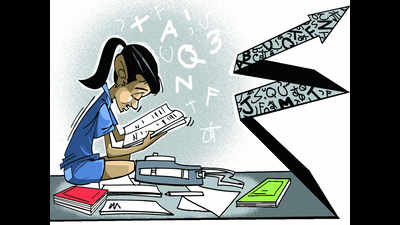- News
- City News
- bengaluru News
- Right to Education has become a profitable venture, say experts
Trending
This story is from May 19, 2017
Right to Education has become a profitable venture, say experts
The Right to Education Act, which Karnataka started implementing from 2012, completed five years on Friday. But experts and RTE activists believe the system has become a profitable venture instead of championing equal education.

Representative image
BENGALURU: The Right to Education Act, which Karnataka started implementing from 2012, completed five years on Friday. But experts and RTE activists believe the system has become a profitable venture instead of championing equal education.
At a public consultation organized at Mahaveer Jain College here, activists and educationists reviewed RTE implementation and challenges in the state.The implementation seems to be focussed on Section 19, which mandates free and fair education up to class 8, and ignores other important sections dealing with provisions that schools need to have.
According to a report by Nagasimha G Rao, state convenor, RTE Task Force: “Parents are unaware of not only the provisions but the act itself. They are promised quality education and basic facilities, which aren’t available in government schools, but once they join private institutions, they are still made to pay excessively for activities that aren’t even conducted.”
Reports presented by BOSCO, an organization that has been empowering street children since 37 years, highlights the multiple reasons which deter children from joining government schools. Some of them are: Lack of toilets, poor faculty and infrastructure and negative opinion of parents about government schools.
“Public awareness is important because if parents and NGOs raise their voice against the system, only then action will be taken,” Rao felt.
— Anindita Rao and Dhatri S Aradhya
At a public consultation organized at Mahaveer Jain College here, activists and educationists reviewed RTE implementation and challenges in the state.The implementation seems to be focussed on Section 19, which mandates free and fair education up to class 8, and ignores other important sections dealing with provisions that schools need to have.
According to a report by Nagasimha G Rao, state convenor, RTE Task Force: “Parents are unaware of not only the provisions but the act itself. They are promised quality education and basic facilities, which aren’t available in government schools, but once they join private institutions, they are still made to pay excessively for activities that aren’t even conducted.”
Reports presented by BOSCO, an organization that has been empowering street children since 37 years, highlights the multiple reasons which deter children from joining government schools. Some of them are: Lack of toilets, poor faculty and infrastructure and negative opinion of parents about government schools.
Y Mariswamy, spokesperson of the Karnataka State Child Rights Organization, said: “In the five years of RTE in Karnataka, 3 lakh children have depended on the act to gain admission to government schools. While the education department prides itself on this number, it shows the inefficiency of government schools, which has resulted in parents depending on admission to private schools.”
“Public awareness is important because if parents and NGOs raise their voice against the system, only then action will be taken,” Rao felt.
— Anindita Rao and Dhatri S Aradhya
End of Article
FOLLOW US ON SOCIAL MEDIA










